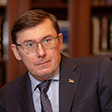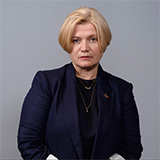Obama and Yushchenko
This article comparing Barack Obama and Viktor Yuschenko was published as 'Campaigning for Change, Capitulating to Compromise' in Business Ukraine magazine on 21 January 2008.
Each democratic country periodically holds elections but, on occasion, they become special elections. These elections are not only a time to vote for governments but to also effect change. Elections associated with a widespread public embrace of the need for change can prove to be revolutionary in their consequences. The key word here is 'can' as it is one thing to ride the wave of public demand for change and quite another to have the inclination and political will to introduce change after the elections.
Examples of elections linked to public demands for change are numerous. In 1979 Britain elected Margaret Thatcher on a wave of public demand for change. In 1997 Britain had enough of eighteen years of the Conservatives and elected New Labour who under Tony Blair rode a wave of public support for change. Old Labour had been unpopular and unelectable. Stephen Harper was elected to power in Canada in 2006 on a wave of change that evicted the ruling Liberals. Nicolas Sarkozy was elected last year on a tidal wave of support for change by French voters fed up with Jacques Chirac who was way past his sell by date.
In 1980 the USA underwent a similar election when Ronald Reagan was elected. This year the US may well go through a similar election. Democratic Party contender Barack Obama has single handedly changed the main theme of the US elections to one of the need for 'change'. Since the Iowa caucus earlier this month all candidates, Democrat and Republican, are saying they support 'change'.
Ukraine underwent a similar Obama wave of public support for change in the run up to the 2004 presidential elections. Opinion polls showed that between two thirds and three quarters of Ukrainians wanted change. Such numbers indicated that not only did the orange camp want change but that at least half of those who voted for Viktor Yanukovych also desired change.
Ukrainians had enough of Leonid Kuchma's decade in office. After the Kuchmagate scandal had revealed that the president may have been involved in the murder of a journalist (Georgi Gongadze) the emperor was seen to no longer have any clothes. Ukrainian polls during Kuchma's decade in office had found that when they were asked which group had most influence in society most Ukrainians believed that they were being ruled by the mafia. Little wonder that the thought of Tony Soprano, sporting a crew neck under a thousand dollar suit, taking over in person after Kuchma left office did not overly excite Ukrainians.
There are many examples of politicians who have ridden the Obama wave of change only to disappoint voters and citizens. Russia's Borys Yeltsin, Serbia's Vojislav Kostunica, Romania's Emil Constaninescu and Mexico's Vicente Fox came to power promising change but disappointed their voters. Will Yushchenko be remembered as one of these four leaders who failed to bring change or as the more successful Estonia's Mart Laar, Bulgaria's Ivan Kostov and the Czech Republic's Vaclav Havel? Hilary Clinton is right when she says in the 2008 US campaign that just saying you want 'change' is not enough. You also need to have the will, desire and ability to implement change.
The mandate of an orange president did not just come from the ballot box but also from the one fifth of Ukraine's population who participated in the Orange Revolution. Ukrainians gave Yushchenko a mandate for all-embracing change. It is the lack of change in Ukraine, especially in the battle against corruption and the rule of law, that has disillusioned many Ukrainians, particularly young people who were the backbone of the Orange Revolution.
The two wings of the orange camp (Yulia Tymoshenko bloc and Our Ukraine) are both members of the centre-right European Peoples Party in the European Parliament. They resemble the two wings of the British Conservative Party – the 'dries' (Tymoshenko) and the 'wets' (Yushchenko and Our Ukraine).
The 'dries' were the Thatcherite reformers who introduced difficult reforms in the 1980s that overcame Britain's epitaph as the 'sick man of Europe'. The 'wets' were the one-nation Conservatives who were more content with the status quo. Since the reforms, Britain has the fifth largest economy in the world and is the second largest economy in the EU after Germany. London is one of the three major financial centres of the world, along with New York and Tokyo. Britain recently overtook the US in its standard of living.
An often repeated claim that Yushchenko could not effect the change he wanted because his electoral victory of 8 percent was low. Polls in the last years of Kuchma's rule showed that a large majority of Ukrainians wanted change that crossed party lines (orange and blue) and regions (western and eastern Ukraine).
In reality Yushchenko's mandate for change was far higher than that for Sarkozy in France whose 53 percent victory was only 6 percent more than his Socialist rival's 47 percent. In Britain's two crucial elections associated with change gave 7 percent victory to the Conservatives in 1979 and a 12 percent victory to New Labour in 1997. Bush was elected in the US with even lower majorities of only 1 percent in 2000 and three percent in 2004. Reagan won by a larger majority in 1980 of 51 percent over Jimmy Carter's 41 percent, making it similar to Yushchenko's victory over Yanukovych.
Compared to British, French and US election results Yushchenko therefore had a relatively large mandate for change that he has still not implemented. His inability to effect change makes it difficult for him to win a second term.
That is why Yushchenko needs Tymoshenko. The two have always been a good team, whether in the 2000-2001 Yushchenko government or in the 2004 elections and the Orange Revolution. They could have fulfilled the yearning for change after Yushchenko's elections but this failed to happen when the Tymoshenko government was removed after only eight months in office. The decision proved to be costly, including to Yushchenko's own popularity, and divided the orange pro-reformist camp for eighteen months.
The orange camp – and Ukrainians desire for change – have now been given a second chance following the 2007 elections. Tymoshenko is again Prime Minister and has hit the floor running in her governments desire to introduce reforms, clean up corruption and provide justice to millions of Ukrainians who lost their savings.
Tymoshenko has though warned that her participation in the 2009 elections remains an open question if her government is thwarted in its attempts at undertaking reforms, as she believes it was in 2005. Tymoshenko has unequivocally stated that if the government is permitted to effectively introduce its reforms then it makes no difference who takes part in the presidential elections from the orange coalition.
Asked if she wanted to be president, she replied:
'This is a very direct question. If they give us the ability to clean out the country in the position of prime minister then that person will have enough work for 24 hours without a vacation, but if they begin to put up obstacles saying don't touch this, these are our people, these are our law enforcement structures, then this is another question'.
Referring to mistakes undertaken in 2005, she replied that, 'there was just one mistake – the assumption that everybody wanted reforms but once the reforms were begun then opposition to them began and overpowered the prime minister'.
Tymoshenko was sending a clear signal to the president that if he attempted to block her reforms and anti-corruption policies, as she believes he and his advisers did in 2005, then she would have little alternative but to run in the presidential elections. If she did run against Yanukovych and Yushchenko she would win the elections.
The president has been unable to work with two of his three prime ministers, Tymoshenko or Yanukovych. To implement the Orange Revolution's demand for change the president and prime minister should now do all they can to work together. The first place to start is in battling corruption, implementing last years election slogan 'everybody equal under the law' and deepen Ukraine's integration into Europe.
Yushchenko's historic legacy and his chances for re-election are dependent on his support for the Tymoshenko governments wide-embracing reforms. Yushchenko rode to power on an Obama wave of popular thirst for change. Will he leave office as a Kostunica or Yeltsin, having failed to deliver on promises for change, or as a Thatcher or Blair who successfully transformed the 'sick man of Europe', Britain, into the EU's leading globalised economy and engine of change.







